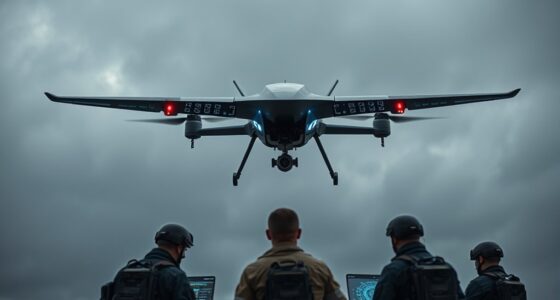Inside IARPA, the intelligence community pushes the limits of AI research to develop trustworthy, robust systems essential for security and decision-making. You’ll find efforts focused on transparency, fairness, and resilience against adversarial threats. They prioritize ethical AI that aligns with human values and guarantees reliability in high-stakes environments. If you want to uncover how these innovations shape critical intelligence operations, there’s much more to explore beyond the surface.
Key Takeaways
- IARPA drives advanced AI research focused on transparency, reliability, and ethical standards for critical intelligence applications.
- It emphasizes robustness against adversarial threats and data shifts to ensure dependable AI performance in high-stakes environments.
- IARPA prioritizes human-AI collaboration, fostering interpretability and oversight to build trust and enhance decision-making.
- The agency promotes rigorous validation, testing, and bias mitigation to ensure AI systems are accurate and trustworthy.
- IARPA aims to maintain technological leadership by integrating cutting-edge AI innovations into national security strategies.

Have you ever wondered how cutting-edge artificial intelligence is shaping the future? At IARPA, the Intelligence Advanced Research Projects Activity, they’re pushing the boundaries of AI to guarantee it’s not only powerful but also trustworthy and reliable. A major focus is on developing ethical AI—systems that operate transparently, respect privacy, and make decisions aligned with human values. This isn’t just about creating smarter algorithms; it’s about building AI that can be trusted in critical intelligence operations, where mistakes can have serious consequences. To achieve this, researchers prioritize machine learning robustness, ensuring AI models can withstand adversarial attacks, unexpected inputs, or data shifts. This means training systems that remain reliable under real-world conditions, avoiding vulnerabilities that could be exploited or lead to erroneous outputs.
In practical terms, IARPA’s work involves designing algorithms that don’t just perform well under ideal circumstances but also adapt and maintain accuracy when faced with unpredictable or malicious challenges. You might think of this as strengthening the AI’s backbone so it can handle the chaos and ambiguity often present in intelligence scenarios. Ethical AI isn’t just a moral imperative; it’s a strategic necessity. When AI systems are transparent and accountable, you can better understand their decision-making processes, which is essential for intelligence analysis, national security, and policymaking. This transparency is often supported by advancements in color accuracy, which help ensure visual data interpretation is trustworthy and precise. IARPA’s researchers emphasize developing frameworks that incorporate fairness, reduce bias, and allow for human oversight, guaranteeing AI acts in accordance with societal norms and legal standards. Additionally, they explore methods like explainability and interpretability, so users can understand how AI arrives at specific conclusions. This creates a feedback loop where humans and machines collaborate more effectively. Moreover, fostering a culture of continuous improvement helps adapt AI systems to evolving threats and challenges.
At the same time, machine learning robustness is a core part of their mission. They use advanced testing methods, adversarial training, and validation strategies to make sure models don’t just perform well on training data but also generalize to new, unseen situations. This resilience is essential for mission-critical tasks, where a failure could have national security implications. Incorporating comprehensive testing and validation techniques enhances AI reliability, ensuring models are resilient to real-world challenges.
Frequently Asked Questions
How Does IARPA Prioritize Its AI Research Projects?
You might wonder how IARPA chooses its AI research projects. They prioritize based on project selection criteria that align with national security needs and innovation potential. Funding priorities focus on high-impact areas like machine learning, data analysis, and autonomous systems. By evaluating technical feasibility, strategic importance, and potential breakthroughs, IARPA guarantees resources support projects that advance the intelligence community’s capabilities and address evolving global threats effectively.
What Ethical Considerations Guide Iarpa’s AI Development?
Think of AI development as walking a tightrope—you need balance, especially when it comes to ethics. You’re guided by principles like algorithmic transparency and ethical oversight, ensuring AI systems are fair, accountable, and safe. IARPA emphasizes responsible innovation, making sure that AI benefits society without unintended harm. By prioritizing these considerations, you help build trustworthy AI that aligns with moral standards and supports national security responsibly.
How Does IARPA Collaborate With Private AI Companies?
You might wonder how IARPA collaborates with private AI companies. They form public-private partnerships to leverage industry expertise and accelerate innovation. By sharing research, resources, and data, IARPA enhances AI development while maintaining security standards. This collaboration fosters innovation acceleration, ensuring cutting-edge technology benefits national security. Your understanding reveals how these partnerships bridge government goals with private sector agility, creating a dynamic environment for advanced AI research.
What Are the Biggest Challenges Facing Iarpa’S AI Initiatives?
Sure, tackling IARPA’s AI initiatives isn’t a walk in the park. You face the colossal challenge of algorithm bias, which can turn smart tech into a joke, and data security, where breaches threaten national secrets. Balancing innovation with ethical standards and safeguarding sensitive info makes progress tricky. So, while you push boundaries, these hurdles remind you that AI’s road to greatness is paved with caution and clever safeguards.
How Does IARPA Ensure AI Research Benefits National Security?
You can see that IARPA guarantees AI research benefits national security by focusing on strong AI governance and risk mitigation strategies. They set strict standards for developing and deploying AI systems, which helps prevent misuse and unintended consequences. By actively managing risks and promoting responsible innovation, IARPA ensures AI advancements align with security needs, protecting national interests while fostering technological progress.
Conclusion
As you explore IARPA’s AI research frontier, it’s clear that pushing the boundaries of technology isn’t just about innovation—it’s about staying ahead in intelligence. Some believe this relentless pursuit could open unprecedented insights, but it also raises questions about ethics and control. Whether you see it as a leap forward or a risky gamble, one thing’s certain: IARPA’s work is shaping the future of intelligence, and only time will reveal its true impact.









